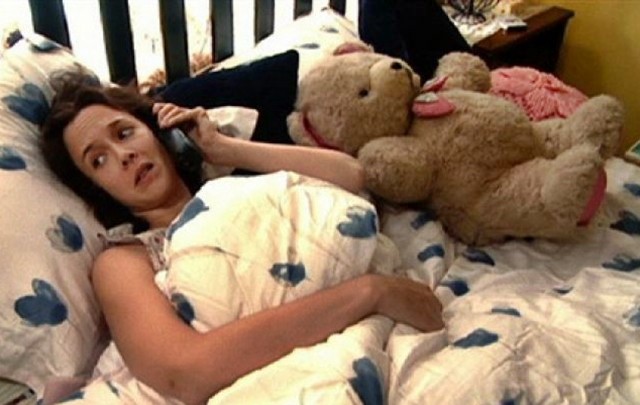
By Jae-Ha Kim
Chicago Sun-Times
October 19, 2001
![]()
A t the end of “Lisa Picard Is Famous,” Griffin Dunne says, “Sometimes reality just needs a little push.”
Apparently, that’s what the filmmakers were trying to accomplish with this mockumentary.
Dunne portrays a filmmaker named Andrew, whose goal is to document a person on the brink of fame. But fame is a nebulous thing, and trying to anticipate who will become famous enough to sell his documentary is a crapshoot. He thinks he has found a winning subject in Lisa Picard, a Penelope Miller look-alike who has won some notoriety for starring in a suggestive cereal commercial.
Lisa is flattered, but also feels a sense of entitlement that her time has come.
After all, she just landed a small role opposite Melissa Gilbert in a made-for-TV movie. Her gay best friend and fellow thespian, Tate, idolizes her and listens attentively as she offers advice on acting, his love life and the best ways to audition.
The line between reality and fiction is occasionally blurred, but not so much that the filmgoer’s view is myopic. Real-life best friends Laura Kirk and Nat DeWolf–the screenwriters of the film–portray Lisa and Tate. They gleefully poke fun at how seriously some actors take their craft. When Lisa explains the complex layers of her non-speaking role in a cheap Japanese “Godzilla” knockoff, the audience is embarrassed for her, because we know she’s trying to convince herself as much as she is her friends.
The film is sprinkled with cameos by real-life famous people, whom Dunne interviews. Poker-faced Buck Henry says he doesn’t wear sunglasses to disguise himself because that’s condescending to his fans.
Instead, he wears a Lone Ranger mask and red lipstick because they draw more attention to him and, well, isn’t that what fame’s all about?
Carrie Fisher says she learned early on that fame was finite. She watched her parents’ (Debbie Reynolds and Eddie Fisher) careers plummet. So when she became a star in her own right, she sunk into depression because she was already anticipating her downfall.
This is something Lisa never thinks about, because fame is so far away from her at this point. Though Kirk and DeWolf are charmingly self-absorbed, their characters aren’t well thought out enough for us to care.
Perhaps that’s how we’re supposed to feel–these are actors who live and breathe for acting and fame. But for the moviegoer, it’s just not enough to sustain interest for 87 minutes.
The movie picks up pace when Tate’s career overshadows Lisa’s. Spike Lee wants to direct the movie version of his one-man play about his gay experience, and Charlie Sheen offers to portray him on the big screen. Kirk depicts Lisa’s envy in such a truthful way that we recognize it as something we have all known.
Never mind that Hollywood’s version of Tate’s tale isn’t about an unrequited gay love affair, but rather a homogenized version with Mira Sorvino playing the role he had written for himself.
A few years ago, the New York Times profiled an unknown model named James King. It was a fascinating story about a teenage girl from the Midwest whom few people outside the fashion world knew. Thanks to her dalliance with heroin addiction, a romance with Kid Rock and a burgeoning film career, King is almost famous.
Lisa Picard has a few more bumps to overcome before she is, too.